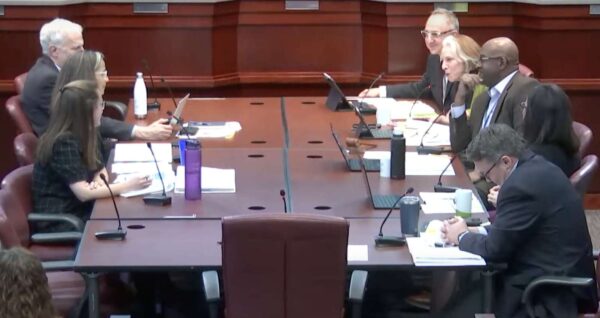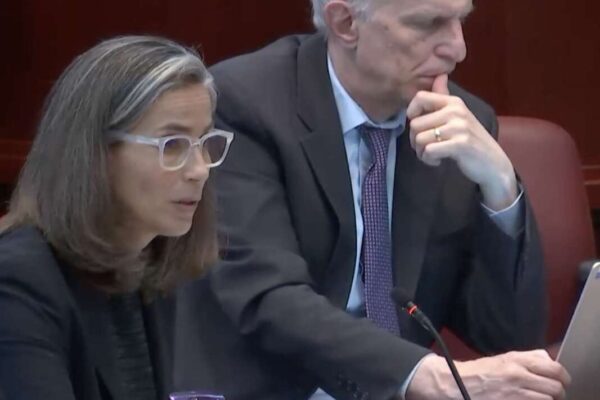
Arlington County’s Dept. of Parks and Recreation says it has a surfeit of programs for teens — but not enough teens to fill them.
Between July 2021 and June 2022, DPR logged 6,350 visits to its teen programs, down from 46,500 visits during the same span of months across 2018 and 2019. The dramatic drop was caused by the cancellation of programs during the 2021 fiscal year, according to County Manager Mark Schwartz’s proposed budget.
That year, DPR logged a low of 3,286 check-ins to teen programs. Now, the parks department is aiming to get those kids involved in activities once again. It projects 24,000 visits to teen programs in the next fiscal year.
“I think that, during the pandemic, a lot of teens reverted to their phones, to their rooms, and really didn’t get out into parks and into our centers,” Jane Rudolph, the director of the parks department, told Board members during a budget work session last week. “I look forward to working with our partners to get them back.”
The Arlington County Board is also motivated to see higher participation in these programs, which are geared toward preventing risky behavior and increasing physical activity, among other goals.
County Board members indicated they would like to see these programs figure into the county-wide effort to tackle the mental health and substance abuse epidemics affecting Arlington youth. Member Takis Karantonis kicked off a round of questions for Rudolph about how her department plans to boost offerings for teens and tweens.
“It’s not so much expanding the offerings but getting people into the programs we offer. That’s where we see our biggest challenges,” Rudolph said. “Where we need to do better, to be honest, is getting word out more about our programs, working better with schools so kids understand where they can come to us.”
Before the work session, ARLnow had asked DPR to share its offerings for teens and tweens. It provided a long list of offerings, including:
- “Out of School Time” programs daily at Gunston and Thomas Jefferson Community Centers
- More than 100 summer camps from exploring outdoors to coding, as well as volunteer and employment opportunities through other camps
- Esports, flag football and basketball leagues
- An annual soccer tournament in partnership with the Arlington County Police Department Gang Prevention Task Force
- DJ and music production classes
Recent community meetings on opioid use, however, encapsulate the gulf between what is offered and what the community actually knows about.
When a group of Latino parents convened the same week 14-year-old Wakefield High School student Sergio Flores died from an overdose, many parents did not know what options were available but seemed desperate for after-school programs and open recreation time at the school gyms, meeting organizers told ARLnow.
In another meeting ARLnow attended a few weeks later, at Kenmore Middle School, a representative from Arlington County Police Department asked the audience to guess how many programs the county has for youth. The answer was more than 300, but one parent challenged how helpful sheer volume if there is a lack of awareness and enrollment is a challenge.
The parks department, for its part, says it is focused on increasing access to information about programs and translating more of it.
“One of our goals is to translate more information past what’s available through Google translate on the website,” DPR spokeswoman Jerry Solomon tells ARLnow. “Considering the vast amount of information we share, we try to be as strategic as we can, but know that there are opportunities for improvement. Working towards more translation and interpretation will help increase accessibility.”
For instance, from the county’s homepage, ARLnow searched “after school programs.” This search led to a webpage describing “Teen Scene,” after-school programming at Gunston and Thomas Jefferson middle schools. The page is translated into multiple languages but a tutorial on how to register was available only in English and the link to register navigates to a different platform only in English.
Another equity-related change DPR is rolling out is pre-registration for summer camps for income-eligible families. The registration process, which experienced large-scale meltdowns in recent years, has been updated to include virtual waiting rooms and higher cancellation fees.
Another new feature is staggered registration dates for DPR-led and contracted out camps. Registration for the former uneventfully began yesterday (Tuesday) and sign-up for the latter begins next Tuesday, March 28.
Other goals include better coordination with Arlington Public Schools, the Dept. of Human Services, civic associations and local community groups.
Solomon said these last two in particularly can help identify “who is missing from our programs and solutions for making the programs more accessible.”

Board member Katie Cristol suggested adding more drop-in hours at the community center and coordinating with the Teen Network Board — a county and School Board-appointed teen advocacy group — to make programming and marketing for programs more relevant.
Rudolph agreed, saying she wants more teens to view local community centers as places to go even if there is not a planned activity. Youth can drop into the community centers at Arlington Mill (909 S. Dinwiddie Street) and Walter Reed (2909 16th Street S.) and take advantage of game areas, for instance.
“There are really large groups of community members who are just hanging out,” Rudolph said. “I’d love to see the teen population joining in that sense of community.”
Board Chair Christian Dorsey suggested more family programming targeting parents and their teenage children, as much of DPR’s current family programming is geared toward those with younger children.
“Granted, getting them to do stuff with us may be a challenge, but we need to have the right things to offer as well,” he said.
The discussion concluded, as others have before, with a witticism from Cristol.
“Do we have enough money in our $1.5 billion to incentivize teens to hang out with their parents?” she quipped.

